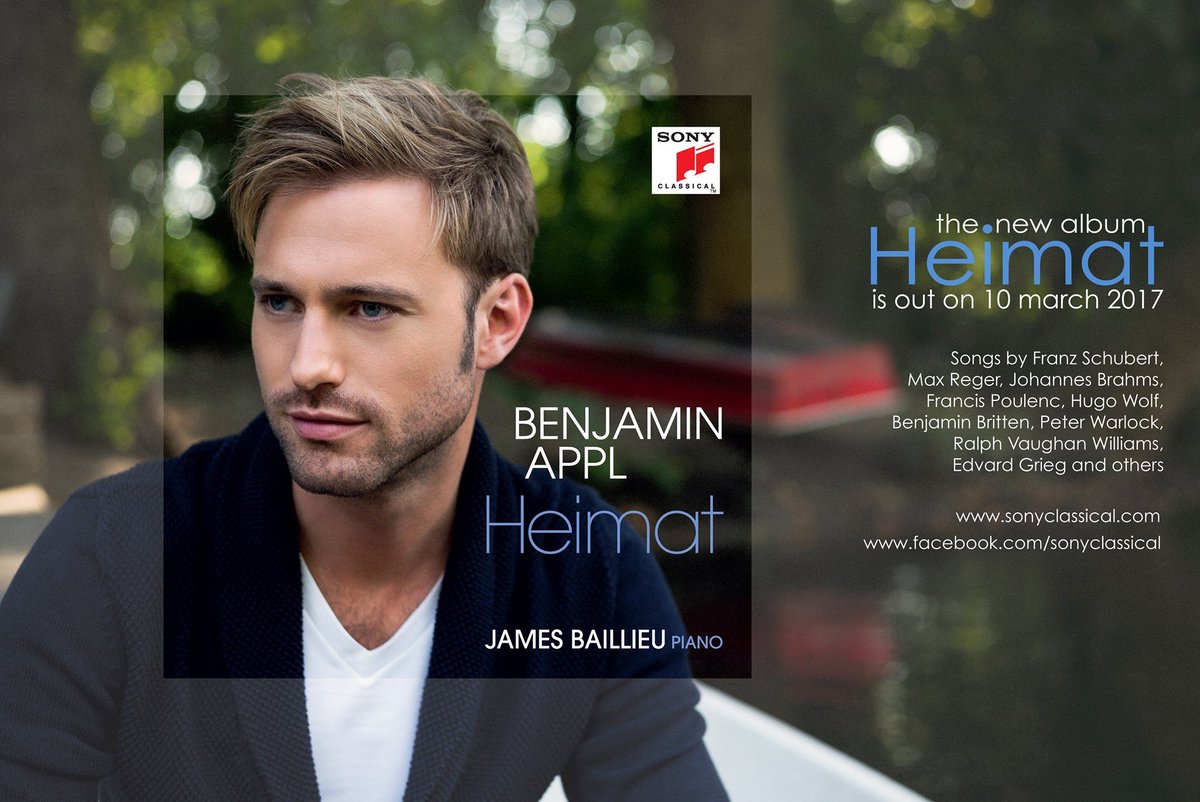Benjamin Appl and James Baillieu Heimat new from Sony. In the booklet notes, Appl reflects on arriving in London in 2010 to study at the Guildhall School of Music. "I felt", he writes, "not only a sense of freedom but also a sense of uncertainty." He could have remained in Germany, the"home"of Lieder, but chose to adapt to a new environment in which he had to find his bearings afresh. On graduation, Appl became part of the BBC Young Generation Artists Programme, whose extensive coverage has launched many careers. The eclectic mix of Lieder and English Song on this disc reflects Appl's background, but there's a lot more to this programme, which is very well thought through and deeply satisfying.
The songs are arranged in eight sections - Wurzeln (Roots), Räume (Locations), Menschen (People), Unterwegs (On the road), Sensucht (Yearning) and Grenzenlos (Without borders), framed by a Prologue (Schubert's Seligkeit D433 and an Epilogue (Grieg's An das Vaterland op58/2 and Ein Träum 0p 48/6. This gives cohesive structure, and brings out the logic in the programme. An individual Winterreise, a journey of self discovery. Much more rewarding than a random selection! Appl and Baillieu set out "alone" but traverse different, diverse threads of European art song.
Thus the section Wurzeln starts with Max Reger Das Kindes Gebet op 76/22, where the piano tinkles, as might a child's toy piano, and ends with Brahms' Wegenlied op 49/4., the world's most loved lullaby, which millions of children know even before they learn formal language. Appl mentions the death of two of his grandparents while he was away from home,which gives these familiar songs personal import, with which we can all identify. Franz Schreker's Waldeinsamkeit might not be quite so well known, but Appl might have included it because the text, a German translation of a Danish poem by Jens Peter Jacobsen, predicates on the phrase "Wir müssen, Geliebteste, leise hinschreiten, ich und du". On a beautiful moonlit night in the woods, the lovers cannot tarry but must move on. Schreker was 19 when he wrote this song, which may perhaps be significant.
And thus, we move on. Romanticism was forward-thinking, always concerned with wanderers, seeking new horizons : the journey as important as the destination. Appl and Baillieu chose two of Shubert's many "wanderer" songs, Drang in die Ferne D 770 and Der Wanderer an den Mond D870, but pointedly matched them with Adolf Strauss Ich weiß bestimmt, ich werd' dich wiedersehen. Fate has torn the lovers apart, but the underlying mood is overlaid with deceptive optimism "I am certain that I will see you again, and hold you in my arms". The song is laconic, a Weimar-infused pop song. But this Strauss wasn't Richard or Johann but Adolf Strauss (1902-1944), imprisoned at Theresienstadt, killed in Auschwitz. Think on that. This is what happens when national pride turns to bigotry. At least Germans deal with such things in a way many Brits cannot. This colours the Sensucht in Schubert's Das Heimweh D456 and DerWanderer D489 with poignant depth. "Ich wandle still, bin wenig froh, und ier fragt der Seufzer wo Im Gesiterhauch tönt's mir zurück; "Dort, wo du nicht bist, dort is ds Glück".
Perhaps the very concept of unchanging Heimat is illusion. Appl and Baillieu made the point still further with Hyde Park, by Francis Poulenc, never François, setting a poem by Guillaume Apollinaire which isn't about London at all, followed by Benjamin Britten's mock Tudor version of Greensleeves. Another brilliant pairing: Ralph Vaughan Williams Silent Noon with Henry Bishop Home sweet Home, the former a masterpiece, the latter sentimental tosh, but Appl and Baillieu perform them with finesse. I love hearing them done with a slight German accent, a reminder that the world is not all Anglo and that music is universal.
This proved an excellent introduction to Peter Warlock's My own country (1927) about an imaginary homeland, which once reached, is a place to lie down and dream "forever and all". John Ireland's If there were dreams to sell continued the dream meme.pointedly, though, dreams can't be "bought" like physical commodities. Appl and Baillieu completed the set with two songs by Edvard Grieg, whose music shaped national identity and led to Norwegian independence. Is Heimat a state of mind? In the last Grieg song (to a poem by a German) "Dort ward die Wirklichkeit zumTraum, Dort ward der Traum zur Wirklichkeit !".
Appl and Baillieu's Heimat follows on from their Stunde, Tage, Ewigkeiten, settings of Heine, from Champs Hill Records (reviewed here) which could become a sought after collector's item. Appl's voice is a joy to listen to, but I hope he'll develop and take more risks. He's very good, and I think he can do it. At times, he sounds too much like Dietrich Fischer-Dieskau, with whom he studied briefly. But no man can be a master until he finds himself first, and his own inner "Heimat". Especially in a genre like Lieder which celebrates freedom and individuality.

No comments:
Post a Comment